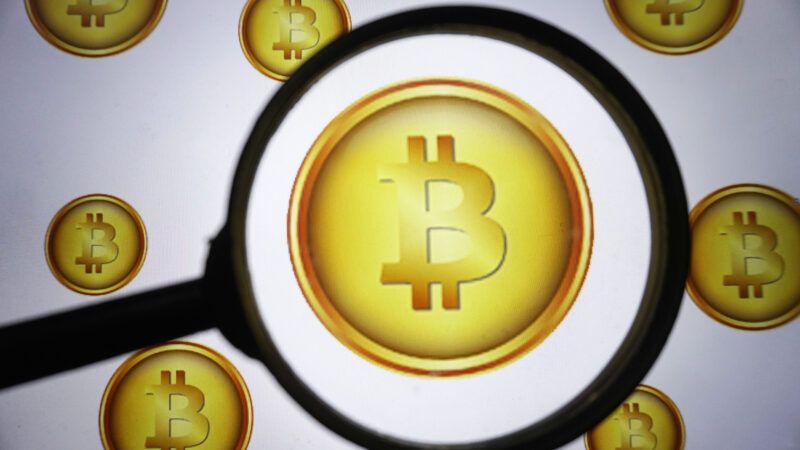Cryptocurrency Fight Holds Up Infrastructure Bill
For now, the side that wants less cryptocurrency regulation and taxation lost.

Cryptocurrency fight holds up infrastructure bill. Passage of President Joe Biden's $550 billion infrastructure bill was held up Sunday by a battle over new cryptocurrency rules. Ultimately, the side that wants less cryptocurrency regulation and taxation lost.
"Crypto got screwed tonight," tweeted Sen. Ted Cruz (R–Texas), in a thread proving he can occasionally still get something right. "There's a partisan disagreement on spending, so Dems objected to ALL further amendments. That means NO vote on Wyden-Lummis to lessen the damage this bill will do to crypto, & NO vote on the Cruz amd. to repeal the new crypto rules altogether."
"The result? The Senate's going to inflict billions of dollars of damage on the growing & exciting crypto industry & drive much of it overseas," added Cruz, accusing the vast majority of his Senate colleagues of knowing nothing about cryptocurrency.
The bipartisan amendment from Sens. Ron Wyden (D–Ore.), Cynthia Lummis (R–Wyo.), and Pat Toomey (R–Penn.) aimed to make sure new regulations in the infrastructure bill wouldn't affect cryptocurrency miners and software developers. "The amendment also includes a provision that the section on crypto brokers will not modify the Securities Act of 1933 or Securities Exchange Act of 1934, two major laws overseeing the federal securities markets," notes CoinDesk.
The Cruz amendment reportedly sought to strike from the bill the new cryptocurrency requirements, which are designed to make it easier for the IRS to catch people who don't pay taxes on cryptocurrency.
But neither amendment received a vote.
"What the Senate said tonight: Let's tax the hell out of something we know nothing about, so we can pass a giant bill we haven't read, and spend the American people's money on stuff we can't afford. It's reckless & harmful," Cruz concluded his Twitter thread.
Members of the Senate eventually voted last night to shut down debate on the bill, with the new rules regarding cryptocurrency reporting left intact.
Eighteen Republicans joined all Senate Democrats in the 68–29 vote to close debate and move on.
"Final passage of the legislation is expected late Monday night, or the wee hours of Tuesday at the latest, unless a deal is reached among all 100 senators to speed it up," notes Politico. But "while Senate passage of the bipartisan infrastructure bill is imminent, the legislation still faces an uncertain future in the House."
"Regardless of the measure's ultimate fate, the fact that crypto regulation has become one of the biggest stumbling blocks to passage of the bill underscored how the industry has become a political force in Washington—and previewed a series of looming battles over a financial technology attracting billions of dollars of interest from Wall Street, Silicon Valley and financial players around the world, but that few still understand," suggests The Washington Post.
Kristin Smith of the Blockchain Association told Politico: "I think Washington is starting to see that crypto is more of a force than anybody ever anticipated."
QUICK HITS
• While some people won't get the COVID-19 vaccine once, others are doubling up.
• Telework forever? The new wave of COVID-19 infections is thwarting business plans to reopen offices in the fall.
• "The coronavirus pandemic in America has become a delta pandemic. By the end of July, it accounted for 93.4 percent of new infections," reports The Washington Post.
• Medical experts push back on the San Diego County Sheriff's Department's latest fentanyl scare tactic.
• What late Supreme Court Justice Ruth Bader Ginsburg really thought about Roe v. Wade.
• David French reviews Andrew Sullivan's essay collection Out on a Limb.
• Meet the woman who could replace New York Gov. Andrew Cuomo.
• Reason's Scott Shackford with more on Apple's new surveillance system: "The new systems announced this week may seem innocuous, but only to those who have not paid any attention to how tech surveillance systems can be abused."
Apple's doing the bidding of a gov't agency: the NCMEC. The group invented the stranger danger moral panic of the 80s and 90s. As @ENBrown has reported, they do absolutely nothing to find missing kids.
The NCMEC does pay huge salaries to career crony charities. 1/2 https://t.co/4v4UpowKOY— Cathy Reisenwitz (@CathyReisenwitz) August 6, 2021


Show Comments (178)